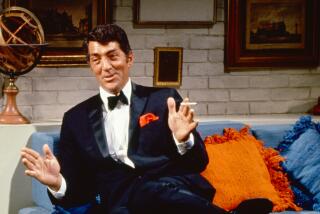‘Mad Men’ recap: ‘The life not lived’
- Share via
It’s the moment we all feared: The era of polyester and platforms has arrived on “Mad Men.”
Pres. Nixon’s speech on the Cambodian Incursion places “Severance,” the first of “Mad Men’s” final seven episodes, in April 1970, but Roger’s David Crosby mustache is really all you need to know that the Me Decade is in full swing. The ties are getting wider, but emotionally things remain on familiar ground. The dreamlike “Severance” finds Don and company contemplating the “life not lived,” to borrow Ken Cosgrove’s words.
Thematically, “Severance” dovetails nicely with this season’s other premiere, “Time Zones,” in which Nixon’s 1969 inaugural address reflected Don’s state of mind. (Tricky Dick Whitman and Tricky Dick Nixon: two peas in a pod.) More than a year of fictional time has passed since then, and the men and women of Sterling Cooper and Partners are richer in goods than ever and, if not exactly ragged in spirit, then contemplating what might have been. The question on everyone’s mind: Is that all there is? Well, is it?
Nine months out from his split with Megan, Don is back in Alpha Bachelor mode, and we are instantly reminded of his wealth. Out for a late night bite at a seedy diner with Roger and a trio of Pretty Young Things, Don shares a story about his Uncle Mack getting shocked by a toaster in the boarding house where he grew up. It’s jarring to see Don, even after a few drinks, speaking so lightheartedly about his past (I have one word for you: Hershey’s.) Has Don reached a new level of self-acceptance in the new decade, or is just the liquor talking? “He loves to tell stories about how poor he was,” Roger chimes in, “but he’s not anymore.” I’d say he’s half right.
Don returns home to a slew of eager messages from various conquests, and he opts for a night of drunken, sloppy canoodling with a TWA flight attendant named Trisha (ominous red wine stain duly noted). As it always has, Don’s work also provides abundant opportunity for ogling beautiful women. Case in point: That fake-out opening, which seems like kinky foreplay between Don and a beauty clad in nothing but lingerie and a $15,000 chinchilla coat until the camera pulls back to reveal Pete, Ted and some other executives snickering away on a couch. It’s an audition, not an assignation.
If Don’s powers of seduction are still awe-inspiring to his dopey co-workers, we know there’s an undercurrent of desperation to all the womanizing. Make that an “overcurrent.” This becomes clear when Don reaches out to Rachel Katz -- nee Menken -- only to learn that she has died. He is ostensibly calling on behalf of Topaz pantyhose, but it’s safe to assume that on some level he’s also hoping to rekindle their decade-old romance.
For Don, Rachel is the proverbial One Who Got Away, a woman he could have been happy with had circumstances been different -- i.e. had he not married Betty first. I’d venture that most “Mad Men” fans -- the sane ones, anyway -- remember her in a similarly fond fashion. She was a woman smart and self-possessed enough to break up with Don once she sensed the despair and self-loathing that propelled his infidelity. And they shared a great deal in common: Both Rachel and Don lost their mothers in childbirth, and both understand the painful, self-abnegating process of assimilating into the American mainstream. The timing wasn’t right before; maybe now was their chance?
Alas, no. Reeling from the news, Don stops by Rachel’s shiva. “I guess I just wanted to find out what was happening in her life,” Don tells Rachel’s sister, though he sounds like he’s trying to convince himself as much as anyone. “She lived the life she wanted to live,” says Rachel’s sister, fully aware of who Don is. “She had everything.” Translation: She wasn’t pining over you. Whatever Don went there for, he walks away with little other than the knowledge that Rachel died of leukemia. He isn’t even able to mourn Rachel, at least not officially as part of the minyan.
Rachel’s untimely death is a tough blow for Don, and he reacts in a time-honored way: by having sex with a stranger. In this case, the lucky lady is Di, the John Dos Passos-reading waitress from the diner, whom Roger mockingly refers to as “Mildred Pierce” then placates with an $89 tip on an $11 tab. While we’ve seen Don revert to this sort of reckless behavior many, many times before, there’s something more mysterious to his interaction with Di. Just who -- or what -- does she remind him of?
Don isn’t sure himself. Returning to the diner after his back-alley encounter, he tells Di how he dreamed of Rachel just before learning of her death. “When people die, everything gets mixed up,” Di says. “Maybe you dreamt about her all the time.” He probably did, but there’s also a porous border between dream and reality in this episode (Pete underlines this when speaking about his experience in California: “Now it sort of feels like a dream but at the time it felt so real.”) Even Di, with just one letter standing between her and “die,” seems more like an otherworldly spiritual messenger than a waitress with highbrow literary taste.
At the same time, Di also seems to be a ghost from Don’s own past, representing the working-class world he left behind along with his identity as Dick Whitman. It hardly seems a coincidence that Don shares details about his poverty-stricken childhood while at the diner. (Greasy spoon confessionals are a big thing with Don: All the way back in Season 1’s “5G,” he met his half-brother Adam at a modest coffee shop, and in “The Suitcase,” he told Peggy how his father died at a Greek diner.) If Rachel’s death reminds Don of the happy romantic life that has eluded him, Di reminds him of what he was able to escape.
A new decade has dawned on “Mad Men,” but for Joan and Peggy the future can’t come fast enough. In a meeting with executives at McCann-Erickson, they’re subjected to offensive (and offensively lame) jokes about spreading L’Eggs and the brassiere market. Peggy’s strategy for dealing with the harassment is to ignore it and try to win the McCann goons over with her steadfast professionalism. Her method seems to work: Eventually they bother to look at the spreadsheet she’s prepared. Joan, the primary target of the sexist barbs, is more clearly bothered by it. “I want to burn this place down,” Joan says, giving voice to the frustrations of professional women the world over.
Once again, despite all they share in common (down to a secret lovechild with a coworker, for crying out loud) Peggy and Joan aren’t able to quite see eye to eye. In a virtual replay of their elevator argument in “The Summer Man,” Peggy questions Joan’s attention-getting clothing, and Joan fires back with a nasty dig about her looks. “You’re filthy rich, you don’t have to do anything you don’t want to,” Peggy finally says, and for once her words seem to have had an effect on Joan.
When she gets a call from Dennis at McCann -- you know, the guy who liked a nice “pear” -- exasperated Joan goes on a shopping spree to Bonwit Teller, the department store where she worked during her brief time away from Sterling Cooper. It’s a fun moment for Joan, but there’s more to it than simple retail therapy. When the shop girl asks her if she used to work there, as we know she did, Joan says she must be thinking of someone else. Can you blame her for fibbing? The ability to buy a truckload of designer threads at full price is more satisfying than any employee discount could ever be. Then again, is Joan really lying? The woman who left the job she loved to work at a department store to support her abusive husband is probably unrecognizable to Joan at this point.
For tightly wound Peggy, the “life not lived” is one of spontaneity and whirlwind romance. Set up on a blind date by Johnny “Not that Johnny Mathis” Mathis (with his brother-in-law, no less), Peggy is torn between competing impulses: she’s both skeptical and excited. At dinner with Stevie (played by Devon Gummersall, known to a generation of TV viewers as Brian Krakow, the nerd jilted by Angela Chase on “My So-Called Life), Peggy is a little too quick to judge when Stevie declines to return the veal he is given by accident. (The meal not eaten, if you will.) But Stevie wins her over with his easy good nature, and by calling her funny and fearless (always a good move, gentlemen). Pretty soon they’re making out and plotting a spur-of-the-moment trip to Paris, but their plans stall when Peggy can’t find her passport.
Rather than let Stevie sleep over, Peggy makes plans to see him in a few weeks. “I thought you were a fling but now I think you may be more,” she says, and boy, do I hope she’s right. Peggy could use a little Stevie in her life. At the office the next day, Peggy has a wicked hangover that’s compounded by embarrassment over her uncharacteristic display of spontaneity. As if to repent for getting swept away in the moment, she reverts back to a defensive stance of cynicism, dismissing Paris as “the place where margarine was invented.”
Then there’s Ken, who initially sees his brutal dismissal as a sign that he’s really meant to write his “sad and sweet” novel, but at the last minute accepts a job as head of advertising at Dow -- the very company he railed against as a “giant machine that makes weapons and poison.”
“I’m going to be your client,” Ken tells Roger and Pete. “And I hate to tell you, but I’m really hard to please.”
The message seems to be that a wounded ego is a more powerful motivator than morality, creativity or the desire for happiness -- put together. While a part of me is sad that Ken will probably never write that novel, it’s going to be way more fun seeing how he tortures Pete and Roger.
Stray thoughts:
--It’s worth noting that Don once proposed flying off to Paris with Midge, but was turned down.
--Mathis brings Peggy Alka-Seltzer the morning after her big date, just as she once did for Don. You’ve come a long way, baby.
--”Casting always starts on time. Can’t you smell the cheap perfume?” -- Meredith is on track to become the next Miss Blankenship
--Ted asks Don if he wants to go to a Vogue party in the Village. Does this mean he’s single now?
--Is Trisha, the TWA flight attendant, the same one who used to flirt with Don on his flights to L.A. to see Megan?
--”There are three women in every man’s life.” So who is Don’s third?
--Pete Campbell, the king of the 1%, complaining about how his newfound millions have pushed him into a higher tax bracket: “I might have to buy an apartment building to hold onto any of it.”
--By skipping ahead nine months, “Mad Men” jumps over Woodstock, Altamont and the Manson murders, three watershed moments in the story of the ‘60s.
Follow @MeredithBlake on Twitter.
MORE “MAD MEN”:
11 career lessons from Peggy Olson
Who’s the best woman for Don Draper?
10 moments Sally Draper should discuss with her therapist
More to Read
The complete guide to home viewing
Get Screen Gab for everything about the TV shows and streaming movies everyone’s talking about.
You may occasionally receive promotional content from the Los Angeles Times.






